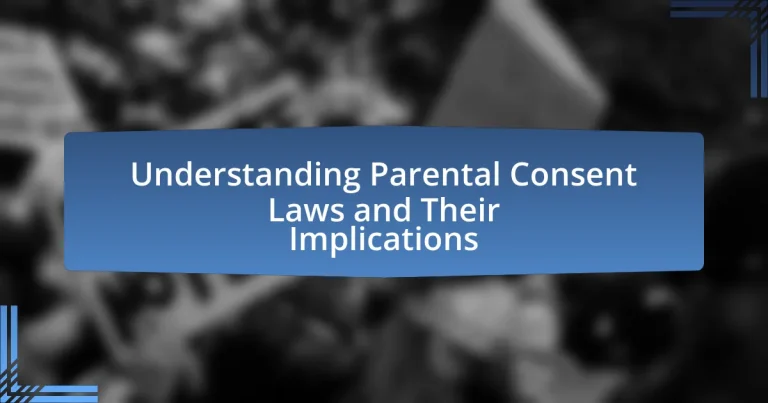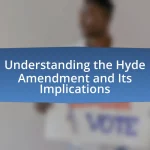Parental consent laws are legal requirements that mandate minors to obtain permission from a parent or guardian before engaging in specific activities, such as medical treatment, marriage, or participating in research studies. These laws vary by jurisdiction, influenced by cultural, political, and legal factors, and are designed to protect minors by ensuring parental involvement in significant decisions. The article explores the implications of these laws, including their impact on minors’ access to services, the rights of parents, and the consequences of non-compliance. It also provides guidance for parents on navigating these laws effectively and understanding their rights within the legal framework.
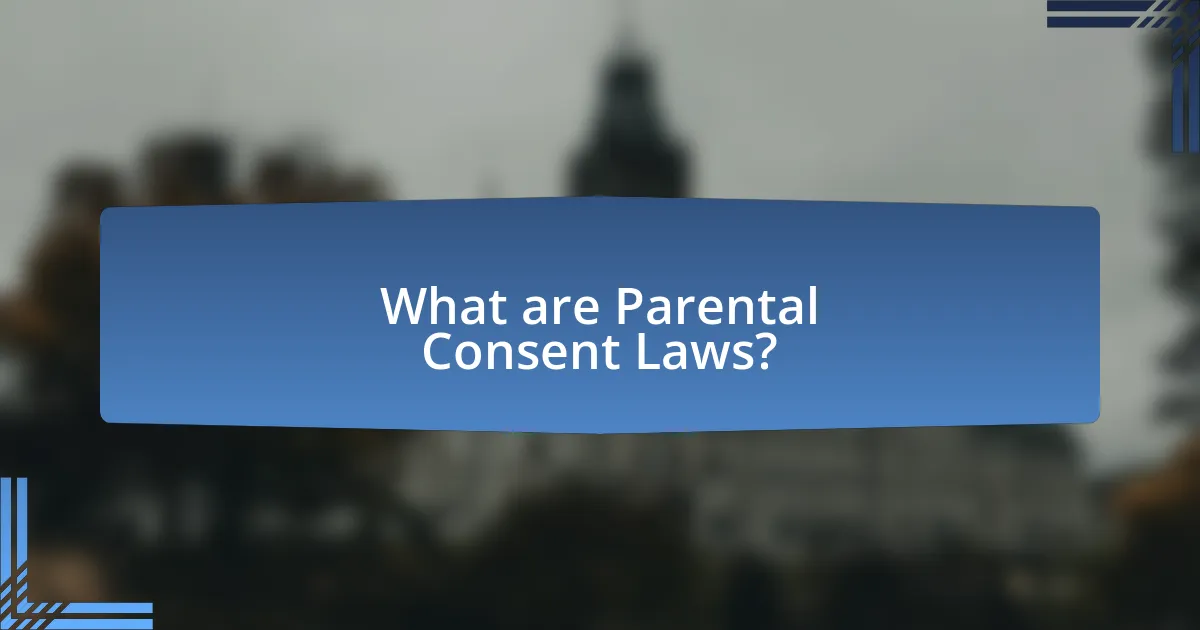
What are Parental Consent Laws?
Parental consent laws are legal requirements that mandate individuals under a certain age, typically minors, to obtain permission from a parent or guardian before engaging in specific activities, such as medical treatment, marriage, or participating in research studies. These laws aim to protect minors by ensuring that parents or guardians are involved in significant decisions affecting their children’s well-being. For instance, in the United States, many states require parental consent for minors to receive vaccinations or undergo certain medical procedures, reflecting the legal framework designed to safeguard minors’ rights and health.
How do Parental Consent Laws vary by jurisdiction?
Parental consent laws vary significantly by jurisdiction, with differences in age requirements, the types of decisions requiring consent, and the processes for obtaining consent. For instance, in the United States, many states require parental consent for minors seeking medical procedures, while others allow minors to consent to certain treatments, such as reproductive health services, without parental involvement. Additionally, some jurisdictions may have specific laws regarding consent for educational decisions or participation in research. These variations are often influenced by cultural, legal, and social factors unique to each region, leading to a complex landscape of parental consent regulations.
What factors influence the differences in Parental Consent Laws across states?
Differences in Parental Consent Laws across states are influenced by cultural, political, and legal factors. Cultural attitudes towards parental rights and children’s autonomy vary significantly, leading to different legislative approaches. Political ideologies, such as conservatism or liberalism, shape the extent of parental control deemed appropriate, affecting the laws enacted. Additionally, legal precedents and state court rulings contribute to the interpretation and application of consent laws, resulting in a patchwork of regulations across the United States. For instance, states with more progressive views may allow minors greater autonomy in healthcare decisions, while more conservative states may impose stricter parental consent requirements.
How do cultural attitudes shape Parental Consent Laws?
Cultural attitudes significantly shape parental consent laws by influencing societal norms regarding family authority and individual rights. For instance, in cultures that prioritize collective family decision-making, laws may require parental consent for minors to access healthcare or participate in research, reflecting the belief that parents should guide their children’s choices. Conversely, in cultures that emphasize individual autonomy, laws may allow minors greater freedom to make decisions without parental approval, as seen in some Western countries where adolescents can consent to certain medical treatments at a younger age. This variation is evident in the United States, where states like California have enacted laws permitting minors to consent to mental health services without parental involvement, reflecting a cultural shift towards recognizing youth autonomy.
Why are Parental Consent Laws important?
Parental consent laws are important because they protect minors by ensuring that parents or guardians are involved in decisions affecting their children’s well-being. These laws help safeguard minors from making potentially harmful choices without adult guidance, particularly in areas such as medical treatment, education, and legal matters. For instance, studies show that parental involvement can lead to better decision-making outcomes for minors, as parents can provide necessary context and support. Additionally, these laws establish a legal framework that reinforces the responsibility of parents to oversee their children’s welfare, which is crucial for promoting healthy development and safeguarding against exploitation.
What rights do parents have under these laws?
Parents have the right to make decisions regarding their children’s education, healthcare, and welfare under parental consent laws. These laws typically grant parents authority to consent to medical treatments, access educational records, and participate in decisions affecting their child’s upbringing. For instance, the Family Educational Rights and Privacy Act (FERPA) allows parents to access their child’s educational records until the child turns 18, reinforcing parental involvement in educational matters. Additionally, laws such as the Health Insurance Portability and Accountability Act (HIPAA) provide parents with rights to access their child’s medical information, ensuring they can make informed decisions about healthcare.
How do these laws protect minors?
Parental consent laws protect minors by requiring that a parent or guardian must approve certain decisions and actions involving minors, such as medical treatment, education, and participation in research. These laws ensure that minors are not subjected to potentially harmful situations without the oversight of a responsible adult, thereby safeguarding their well-being and rights. For instance, in the United States, the Health Insurance Portability and Accountability Act (HIPAA) mandates parental consent for minors under 18 to access medical records, ensuring that parents are informed about their child’s health decisions.
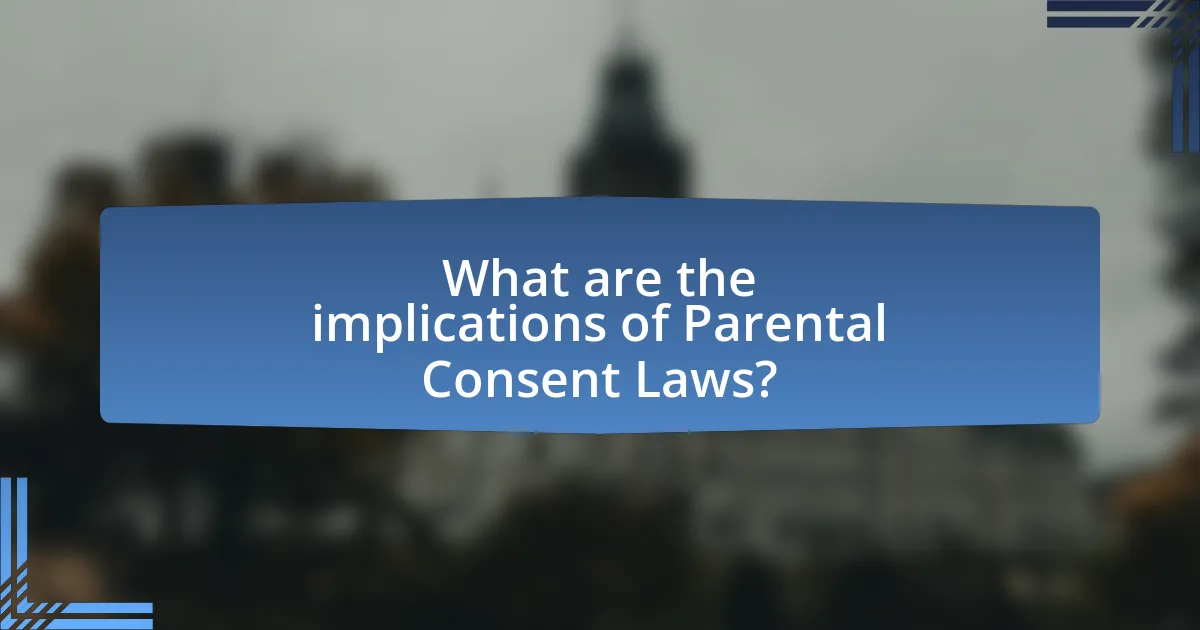
What are the implications of Parental Consent Laws?
Parental consent laws require minors to obtain permission from their parents or guardians before accessing certain services, such as medical treatment or participating in research studies. These laws can limit minors’ autonomy, potentially delaying necessary medical care or access to information, as seen in cases where adolescents may avoid seeking help due to fear of parental involvement. Research indicates that in states with strict parental consent laws, rates of teenage pregnancy and sexually transmitted infections can be higher, as minors may not seek preventive care. Thus, while intended to protect minors, these laws can inadvertently hinder their access to essential health services and information.
How do Parental Consent Laws affect minors’ access to services?
Parental consent laws significantly restrict minors’ access to various services, including healthcare, mental health support, and educational resources. These laws typically require that a parent or guardian provide permission before a minor can receive certain services, which can lead to delays or complete barriers in accessing necessary care. For instance, in many states, minors cannot obtain reproductive health services without parental consent, which can result in increased rates of unintended pregnancies and sexually transmitted infections among adolescents. Research indicates that when parental consent is mandated, minors may avoid seeking care altogether due to fear of parental knowledge or disapproval, thereby negatively impacting their health outcomes.
What services typically require parental consent?
Services that typically require parental consent include medical treatments, psychological counseling, participation in research studies, and enrollment in certain educational programs. For instance, minors often need parental consent for surgeries, vaccinations, and mental health services due to legal regulations that protect their welfare. Additionally, research involving minors usually mandates consent from a parent or guardian to ensure ethical standards are met. Educational programs, particularly those involving field trips or extracurricular activities, often require parental approval to safeguard the child’s interests and ensure informed participation.
How does the lack of consent impact minors’ rights?
The lack of consent significantly undermines minors’ rights by exposing them to decisions and actions that they may not fully understand or agree with. This absence of consent can lead to violations of their autonomy, as minors are often unable to legally advocate for themselves in situations involving medical treatment, education, or legal matters. For instance, research indicates that minors who do not have parental consent for medical procedures may face barriers to receiving necessary care, which can adversely affect their health outcomes. Additionally, legal frameworks in many jurisdictions recognize that minors have limited capacity to consent, thereby reinforcing the need for protective measures that uphold their rights and ensure their voices are heard in matters that affect them.
What are the consequences of violating Parental Consent Laws?
Violating Parental Consent Laws can lead to significant legal consequences, including civil penalties, criminal charges, and potential lawsuits. For instance, unauthorized actions taken without parental consent, such as medical procedures or data collection, may result in fines or other legal repercussions for the responsible parties. Additionally, minors may have the right to seek damages for any harm caused by such violations, reinforcing the importance of adhering to these laws to protect both the rights of parents and the welfare of children.
What legal repercussions can arise from non-compliance?
Non-compliance with parental consent laws can lead to significant legal repercussions, including civil penalties, fines, and potential criminal charges. For instance, violating these laws may result in lawsuits from parents or guardians seeking damages for unauthorized actions taken regarding their children. Additionally, entities such as schools or healthcare providers that fail to obtain proper consent may face regulatory sanctions, including loss of licenses or accreditation. These consequences underscore the importance of adhering to established legal frameworks governing parental consent to avoid serious legal liabilities.
How do violations affect the involved parties?
Violations of parental consent laws significantly impact the involved parties, including minors, parents, and institutions. For minors, such violations can lead to unauthorized medical treatments or exposure to harmful situations, undermining their safety and well-being. Parents may experience legal repercussions, such as fines or loss of custody, which can strain family dynamics and parental authority. Institutions, such as schools or healthcare providers, face liability issues, potential lawsuits, and damage to their reputation, which can affect their operational integrity. These consequences highlight the importance of adhering to parental consent laws to protect the rights and welfare of all parties involved.
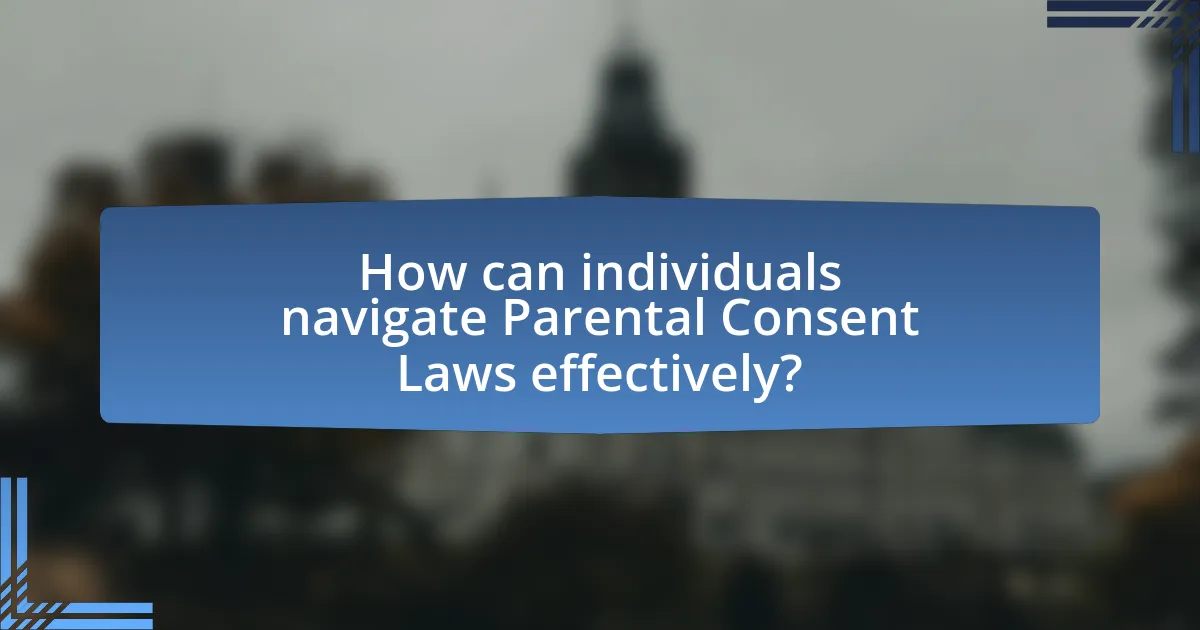
How can individuals navigate Parental Consent Laws effectively?
Individuals can navigate Parental Consent Laws effectively by thoroughly understanding the specific laws applicable in their jurisdiction. Each state in the U.S. has distinct regulations regarding parental consent, particularly concerning minors’ rights in areas such as healthcare, education, and online activities. For instance, the Health Insurance Portability and Accountability Act (HIPAA) mandates parental consent for minors under 18 to access certain medical services, while the Children’s Online Privacy Protection Act (COPPA) requires parental consent for collecting personal information from children under 13. By familiarizing themselves with these laws and consulting legal resources or professionals when necessary, individuals can ensure compliance and protect their rights and those of minors.
What steps should parents take to understand their rights?
Parents should begin by researching local and federal laws regarding parental rights and consent. This includes reviewing statutes related to education, healthcare, and child welfare, which can vary significantly by state. Parents can access resources from government websites, legal aid organizations, and educational institutions that provide information on parental rights. Additionally, attending workshops or seminars focused on parental rights can enhance understanding. Consulting with a family law attorney can also provide personalized guidance based on specific circumstances. These steps ensure that parents are informed about their rights and responsibilities, enabling them to advocate effectively for their children.
Where can parents find reliable information about these laws?
Parents can find reliable information about parental consent laws through government websites, legal aid organizations, and educational institutions. Government websites, such as those of state departments of education or health, provide official guidelines and updates on laws affecting parental consent. Legal aid organizations often publish resources that explain these laws in accessible language, while educational institutions may offer workshops or informational sessions on the topic. These sources are credible and regularly updated, ensuring that parents receive accurate and relevant information regarding their rights and responsibilities under the law.
How can parents advocate for their children’s rights within the legal framework?
Parents can advocate for their children’s rights within the legal framework by understanding and utilizing relevant laws, engaging with legal professionals, and participating in advocacy groups. Knowledge of laws such as the Individuals with Disabilities Education Act (IDEA) empowers parents to ensure their children receive appropriate educational services. Consulting with attorneys who specialize in family law can provide parents with tailored advice and strategies for navigating legal challenges. Additionally, joining organizations like the National Parent Teacher Association (PTA) can connect parents with resources and support networks that amplify their advocacy efforts. These actions collectively enhance parents’ ability to effectively represent their children’s interests within the legal system.
What best practices should be followed regarding Parental Consent?
Best practices regarding parental consent include obtaining clear and informed consent from parents or guardians before collecting personal information from minors. This process should involve providing comprehensive information about the purpose of data collection, how the data will be used, and the rights of the parents and minors involved. Additionally, organizations should implement age verification methods to ensure that consent is being sought from the appropriate guardians. According to the Children’s Online Privacy Protection Act (COPPA), organizations must also allow parents to review and delete their child’s information, reinforcing the importance of transparency and control in the consent process.
How can parents ensure they are compliant with the laws?
Parents can ensure compliance with the laws by staying informed about local, state, and federal regulations regarding parental consent. This includes understanding specific laws related to education, healthcare, and digital privacy that affect minors. For instance, the Family Educational Rights and Privacy Act (FERPA) governs access to student education records, while the Children’s Online Privacy Protection Act (COPPA) regulates the collection of personal information from children under 13. By regularly reviewing updates from reliable sources such as government websites and legal resources, parents can maintain awareness of their rights and responsibilities, thereby ensuring compliance with applicable laws.
What resources are available for parents seeking guidance?
Parents seeking guidance can access various resources, including government websites, parenting organizations, and legal aid services. Government websites, such as the U.S. Department of Health and Human Services, provide information on parental consent laws and related regulations. Parenting organizations, like the American Academy of Pediatrics, offer resources and advice on navigating consent issues. Legal aid services can assist parents in understanding their rights and responsibilities under the law. These resources are designed to help parents make informed decisions regarding consent and ensure compliance with legal requirements.
